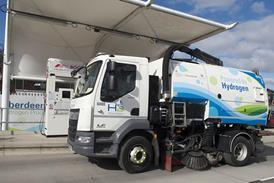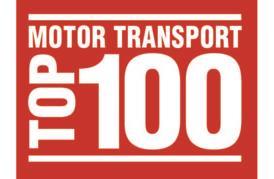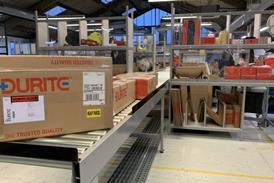
Next year sees tyre distributor ATS Euromaster celebrate its 50th anniversary since setting up in the UK. Although part of Michelin, it retains its independence, offering a full range of products and services.
Simon Tattersall (pictured) was appointed head of national fleets in 2013, having previously been ATS Euromaster’s head of national truck. He joined ATS in 2009 after 28 years with parent company Michelin.
While Tattersall is responsible for all ATS’ national fleet accounts covering cars and vans as well as trucks, he says commercial vehicles are an important market for ATS. “My department is responsible for well over £100m turnover and commercial vehicles make up a big chunk of this business.” he says.
After a period of instability in the truck tyre market a couple of years ago when raw material shortages meant finished tyre prices shot up, Tattersall says the UK truck tyre market “is fairly stable at the moment”.
“The impact of manufacturer price increases peaked about 18 months ago after a traumatic period when price increases were as much as 30% or 35%, driven predominantly by raw materials – steel, rubber and petroleum based products,” he says. “That has levelled off to a great extent and we are not seeing that volatile market. There are little bits of movement but they are realignments within the manufacturing pricing process. I can’t see any significant changes in the next six to eight months.”
Casing shortage
While the UK economy is now picking up and this is starting to feed through into rising sales of new tyres, the last recession has resulted in a shortage of used tyres to retread.
“The economy fell off dramatically with the result there weren’t as many new vehicles, particularly trailers, being purchased,” says Tattersall. “The impact of that is now starting to bite in terms of casing availability so the remoulders are struggling to get casings. That has come at the same time as cheaper products are coming onto the market from places like China and that is creating a perfect storm. Remoulds are difficult to obtain and the price of a remould is in some cases greater than a cheap imported tyre. So that dynamic is changing the new v remould balance.
“That is changing the policy decisions some fleets are making, and they are moving from a new/remould to a new/new policy.
Sales volumes of remoulds are falling, driven by casing availability, and the volume of lower priced tyres is increasing.”
According to Tattersall, larger fleets have however not been swayed towards budget tyres.
“In my field of national fleets, we are seeing people working to a policy and that generally tends to be a premium policy,” he says. “The major manufacturers are retaining those businesses and we don’t see an awful lot of low- or mid- range products – apart from occasionally on trailers.”
Premium choice
Although part of the Michelin family, ATS will fit any tyre within reason demanded by its customers. So in Tattersall’s experience how do fleets choose between the premium tyre brands?
“If I knew the answer to that I would be making a lot more money!” he laughs. “It’s a lot of things. It is having the ability to prove one product over another. A lot if it is about relationships between the purchaser and his tyre supplier and/or manufacturer. It is also about how the manufacturer presents the product – is it always in the news, always in the trade press and is it seen as innovative, or is it a manufacturer you don’t really hear a lot about?
“There all sorts of factors and at the end of the day there is always the fact that this one is £400, this is £390 and this is £380. Customers make decisions based on lots of things we don’t know about. When we speak to customers they tell us what they want us to know. Different fleets approach it in different ways. Some will approach it very much from a cost point of view, others from a wider view including vehicle uptime, roadside breakdowns, durability and driver comfort.”
So have the EU tyre labelling regulations requiring manufacturers of all new tyres to provide ratings for wet grip, noise and fuel economy had any effect on the buying habits of national fleets?
“Good question,” responds Tattersall. “Tyre labelling is still relatively new and fleet buyers are just starting to understand and accept it. Undoubtedly I have had more conversations latterly than before tyre labelling came out. So there is a growing awareness about it. We have had two major fleets question their procurement process and one of them changed their policy because of tyre labelling to say we will only fit B and above rated tyres in this particular category. On the heavy truck side it still hasn’t received the same attention – but people are aware of it.”
Label limitations
Like many in the industry, Tattersall is critical of the fact that tyre labelling only covers three important but limited characteristics.
“By applying a label to a tyre that covers a number of critical areas almost gives the consumer the idea that that is all a tyre does,” he says. “But a tyre does a lot more than consume fuel, wet weather brake or make a noise. Unless the consumer understands exactly what a tyre has to do you can’t make a completely informed decision.”
Perhaps the most obvious omission is a rating for the mileage a tyre could be expected to deliver, though as ever the devil is in the detail.
“Would it help us – I think it would,” says Tattersall. “But what conditions is it operating in and what sort of vehicle is on? We know that if you take a vehicle operating in Holland for example, and put the same vehicle in the UK its tyre performance would be different. Mileage performance is undoubtedly important and generally speaking if you accept the principle that this tyre performs at an A rating and this tyre performs at a B rating in terms of mileage then you have to assume that has been tested for the market it is being sold in. That is something that people would readily recognise.”
Fuel saving
The high cost of fuel in recent years has focused attention on fuel efficient tyres and all the major tyre manufacturers have developed low rolling resistance ranges. But many operators still remain to be convinced that the fuel savings outweigh the increased cost of reduced tyre life.
“Everybody, whether it is an individual motorist or a fleet operator, is aware of the cost of fuel and their vehicles’ consumption figures,” says Tattersall. “A lot of it comes back to how successful the manufacturer has been in proving that a particular product will work in a particular environment and can demonstrate the amount of fuel saving. Michelin and all the manufacturers are putting a lot of effort into that.
“Almost irrespective of the type of operation you are involved in, there is almost a moral duty to look at what you can do to reduce fuel consumption. There is a trade off – there is no point spending £1,000 on a tyre if it doesn’t produce a £1,000 of fuel saving – but once you have done your calculations I think any operator would recognise the benefits of fuel efficient tyres. It doesn’t matter if the vehicle is running from Glasgow to London and back every day or doing shorter journey cycles - if there is a fuel benefit to be had you should take it.”
Contract wins
While all the premium tyre manufacturers now have fleet management operations, ATS has been picking up significant contract wins with large national fleets. This is for several reasons Tattersall believes.
“ATS is unique now as we have 343 locations where we can provide a standard level of service and compliance with health and safety requirements etc, nationwide, irrespective of geographic position,” he says. “Generally speaking, manufacturers have groups of independents who form partnerships so we believe we have a real differentiation there between us and any other service providers. There are some excellent service providers in small geographical clumps but what there isn’t is a standard nationwide service provision.
“Yes we are aligned to Michelin and wherever possible we would use group product. That too gives us a unique selling point for customers with large fleets with a tyre policy. If that policy is Michelin they expect Michelin to be fitted at every single intervention. There is no point having a policy and then fitting four or five different makes. I am very proud that we have contracts running at the moment where we are achieving 99.5% policy fit. That is phenomenal when you think that is over 200 or 300 locations where we are delivering that level of service.”
“We do what it say’s on the tin - we have a very good rapid response breakdown service, we have lots of locations so we are easily accessible and we are experts in our field. We have 900 service vehicles out there 7 days a week, 24 hours a day. We have very experienced staff – the average length of service of our technicians is 16 years. Our core values are outstanding customer care and honesty.”
Talking tyre labels
Under the UK legislation enacting the EU tyre labelling directive, distributors are obliged to make buyers aware of the tyre performance rating at the point of purchase.
John Hill, ATS Euromaster’s head of B2B marketing, takes the lead for ATS on tyre labelling. He says that in April the government launched an “unexpected” consultation exercise asking the industry if the government’s proposed light touch approach to enforcement was the right one for the tyre industry.
This closed in May but the government has yet to publish its findings.
In its response, ATS said tyre buyers are not going out of their way to ask for tyre performance data and that government needs to take a more active role.
“We made the point that if you want to make this stick there needs to be an education process on your side to help drive those conversations,” said Hill. “If the government is relying on the industry to remember to have those conversations and they are not going to enforce it, then it will never stick and there will be a very slow take up.
“We still don’t know in cast iron terms what the fines are going to be – they can be up to £5,000 - but what is a transgression? Is there a sliding scale? So until that kicks in and companies start being fined it is not as much on the radar for the industry as it could be.”
To head off potential fines Hill is making sure ATS’s house is in order. “My job is to continually remind our operational colleagues that they need to be talking about it and we self-regulate by mystery shopping to encourage this.. We are exploring alternative ways in which we can identify transgressions and in parallel encourage positive behaviours through awareness and education .It’s far easier for us to get our house in order at this stage rather than wait until we start getting fined.”









![Mercedes-Benz_eActros_600_(1)[1]](jpg/17820_mercedesbenz_eactros_600_11_978080.jpg)





